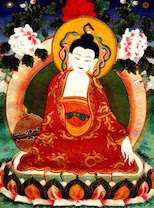Koso Wasan 6
Those who desire quickly to attain
The stage of non-retrogression
Should, with a heart of reverence,
Hold steadfast to and say Amida's Name.
Devotion

In Theravada countries monks move out of their monasteries every day to collect offerings of food. In Mahayana countries people visit the 'homes' of Buddhas and Bodhisattvas (temples and shrines) to adore them. A marginal note accompanying this verse implies that these two apparently different activities express the same impulse. Generosity (Sk. dana) and faith - the 'heart of reverence' - represent the core of the Dharma. Because they portend complete negation of self, the spirit of giving and of devotional love desert the self and the false sense of its own immutability in favour of non-self, the other; whether it is a monk seeking dana or a Buddha who is the source of faith. Herein lies the very heart of the Buddha Dharma and its quintessential reality. The idea that we may attain faith with a view to our personal salvation is essentially absurd; it is in the realisation of 'non-self' - perfect giving and perfect devotion - that salvation lies.
The future outcome is simply a natural outcome of our present disposition, and nothing more. Indeed, the dharma is a religion of neither the future nor the past, only of the present.
The Buddha Dharma's analysis of 'unredeemed' existence is that it is imbued only with greed, anger and delusion (Sk. lobha, dvesa and moha). These profound distortions of reality are the very drivers of life, as any biologist with attest. If these three 'roots of evil' are accepted and encouraged, the result will be profound and unremitting pain - pain which is not just physical but existential and organic. At the most entrenched level, the 'three roots of evil' create an illusion of a self and a concommitant and tenacious attachment to it.
The illusion of self has reached its nadir in the children of the eighteenth century European enlightenment. In cultures which derive from this movement of thought, greed, anger and delusion not only prevail but are cherished as virtues. Individuality - that is to say, self-assertion which brooks no restraint - is of course the perfection of anger and aversion. Consumersism - that is to say, the cultivation and satisfaction of appetites and satiety - is the perfection of greed. Information - that is to say, saturation of our consciousness by knowledge ungoverned by wisdom - is the perfection of delusion. These three principles govern life in our world and our time. While they are inevitably at the heart of existence in our time and in our world, the three roots of evil - greed, anger and delusion - have triumphed at last and have been enshrined as the epitome of all that it real and true.
There is no way we can extricate ourselves from our current environment and all attempts to do so - even those which are ostensibly motivated by the desire the follow the dharma - invariably become deranged and debilitated by the underlying ethos of the time. Hence, even the dharma is in large part these days competitive and commercially oriented - it is impossible for it to be otherwise.
Yet, deep within each of us lies the wisdom which pervades all things - Buddha. It is not ultimately overwhelmed by our circumstances or trammelled by the prejudices and expectations of our age. We are so overwhelmed by the illusion of existence that we are literally incapable of progress without taking hold of the end of a rope which is held by an unseen and unknown benefactor - one who is concerned only with our ultimate well-being. The tousled and worn rope-end which is held out to us is Namo Amida Butsu - the call from beyond anything that we can comprehend.
Namo Amida Butsu can be with us as we drift off to sleep in the evening and when we wake in the morning. No matter how busy we are, or how engaged in the many distractions that captivate us, Namo Amida Butsu can always be taken up and remembered. In these times, when greed, anger and delusion have made their homes as the supreme govenors of society and of life, Namo Amida Butsu is the only link with true reality that we can have.
Namo Amida Butsu is the act of devotion itself - the outward manifestation of Amida Buddha's shinjin, Amida's true heart. Apart from it, there is no way we can extricate ourselves from the realm of lies which is now the triumphant root-and-branch of our way of life.